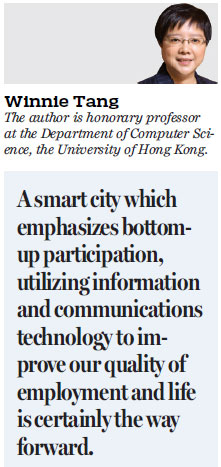Smart city initiative vital in taking HK forward
Updated: 2017-09-11 07:51
By Winnie Tang(HK Edition)
|
|||||||
Chief Executive Carrie Lam Cheng Yuet-ngor will deliver her first policy address soon. The public have long expected that the new CE would use her maiden policy address to tackle major problems, one of which is to help inject new impetus into Hong Kong's economy, and provide our young people with more opportunities for upward mobility. I think a smart city which emphasizes bottom-up participation, utilizing information and communications technology to improve our quality of employment and life is certainly the way forward.
How can a smart city achieve these goals? Governance with transparency that encourages public participation and creativity is the key success factor I learned from Los Angeles in the United States.
Lilian Coral, chief data officer (CDO) of Los Angeles, came to Hong Kong earlier this year to share best practice in LA. As the CDO, her major responsibility is to bring in tens of government departments to provide data so government departments, public organizations and her office can collaborate with each other to boost efficiency and eliminate the information bottleneck.
Sharing data with the public is essential to encourage creativity. As a result, people in the city were bubbling with ideas while startups were launching, as Mayor of Los Angeles Eric Garcetti described after the launch of LA's open-data platform GeoHub.

In June this year, the Hong Kong Smart City Blueprint Consultancy Study released by the government recommended establishing a high-level officer to coordinate various bureaus in ensuring the smooth implementation of smart-city policies.
It's really assuring to hear such news. In fact, in October last year, the Smart City Consortium (SCC) submitted an interim report to the government on future development of the smart city. It pointed out that the government must set up a high-level dedicated department which is very important in that it has to persuade all government establishments to adopt "digital by default" (that is, open data with an application programming interface), and also the department has to establish public data specifications, determine guidelines on collection and process data to protect personal privacy, review the relevant legislation and formulate the implementation timetable. It is an extremely demanding task.
LA, by establishing a strategic position of CDO, is a good example the government should follow.
When talking about LA, I must also mention the well-known Mayor's Dashboard which was boldly presented by Garcetti in 2013. The dashboard not only helps manage the city, but it also allows the public to monitor government's performance.
It lists the data related to people's livelihood and divides the figures into the following four areas:
1. Prosperity - subdivided into three categories: economic development (such as number of new jobs, film and TV series shooting days); economic opportunities (family rent burden, poverty - proportion of elderly and children, homeless); veterans (employment ratio and industry).
2. Livability - three areas: urban services and sustainable development (such as the ratio of girls and youth participation in sports, days elapsed before potholes in streets are repaired); water and electricity (such as household daily water consumption, solar power supply); and traffic matters (eg traffic accidents, bus timeliness).
3. Public security - real-time crime information, including the type of case (violence, theft, drunkenness), and the distribution of cases on map; the response time of police, firefighters and hotline, as well as ambulance arrival time, etc.
4. Efficiency - government efficiency, such as the number of civil servants, visitors to the LA City website, city reserves, and the non-emergency 3-1-1 hotline performance.
Coral said: "The focus of open data policy is to translate the data into wisdom, through free use of the data and associated derivative work, we can enhance the city's innovation and governance vitality." This is also my expectation of the smart city in Hong Kong and the new special administrative region leadership team.
(HK Edition 09/11/2017 page11)